Hackathon Definition: A collaborative, creative problem-solving, idea-sprint event that brings together thinkers, designers, and doers from interdisciplinary backgrounds to tackle complex and diverse challenges together. These solutions that should help shape a better future for our ocean can take any form, including services, websites, mobile apps, games, hardware devices, and robots, etc. Within the given time-frame, usually 1-3 days, participants have to brainstorm, design and develop a feasible idea for a solution, and sometimes even come up with a business model for the solution, and then present their unique idea in a short catchy pitch to the judges. This creative process is supported by mentors, i.e., professional stakeholders coming from the private sector, policy making, and academia. Usually, the winner of a hackathon will be given a monetary prize or other support to achieve/realize their project.
- Juliette’s Hackathon journey as a participant
- Rebecca’s Hackathon journey as a mentor
Juliette’s Hackathon journey as a participant
I was very lucky to join the UN Ocean Conference Youth and Innovation Forum, organized by Sustainable Ocean Alliance together with the United Nations and NOVA economic & business school, preceding the UN Ocean Conference in Lisbon, Portugal in 2023. I embarked on a 2-day brainstorming experience, and I was so into it that I did not see Jason Momoa nor hear the ocean calling just a few meters away on the beach of Cascais. Among other things, I learnt how to write “business” (no, I still get the spelling wrong every single time).
Imagine, 130 young ocean professionals from all over the world, gathering with the same goal: finding solutions for our cohabitation with the ocean. Teams were organized into different themes, and with the less-than-24h clock starting, my team was ready to prepare a pitch for the next morning. Five strangers from different continents, with different ages, and different backgrounds, marine NGO officers, PhD students, ocean leaders, had to work together.
Sustainable seafood…. Sustainable seafood… what bells does this ring for you? We talked for hours, what do we need to revolutionize in seafood production? For one day, we jumped from one idea to another, bringing -for me- more questions each time. It did feel like an accelerated incubation of an exciting scientific project.
It did not feel like an exciting scientific project anymore when we (I?) then had to pretend that we know, and even further, that our product is the solution. I was not selected to bring my scientific method, probably a bit of my knowledge – which revealed way too limited for all the subjects we explored anyway and especially to create a business model. To create this model, in so few hours, was obviously a challenge, and did challenge the scientist in me.
Bringing up all these ideas, I had my phone at hand all the time ("oh wait, what did the IPBES publish about that?", "let me find that study that could help"). I guess along my academic years and without clear notice, I became stuck in that precautionary, literature-informed mind, useful if you know how to use it. Here my team played a great role by being different, by building up on what each of us could bring. (I thought to myself) "Juliette, focus, we need an idea - grab another coffee. Stop with these regulations or education ideas; think business, product, marketing". The mentors also helped a lot by directing focus on what is needed, not to influence us from the start, but rather by completing an idea or highlighting its originality or weaknesses. I am sure mentors also get a lot from all of our discussions.
Altogether, we finally found an idea. To pitch our business model on humanly and ecologically ethical invasive species management and seafood production, I knew we did not need to know much on how to make it really happen. I burst out laughing several times seeing how bold we got, given the high level of no idea we had on the topic - remember our product is THE solution.
I guess most of the trick is then to be able to sell that solution, leading everyone away from noticing it is far from being workable. Again, our team diversity and mentors made it all: catchy entrance, big words, saving the ocean and helping people, with tasty products at big scale, sold by good speakers. I am usually pretty good at communicating… in scientific conferences. Selling a product is a whole other game and I would encourage any scientist to attend such pitches and pay serious attention. My team colleagues were real-life-TedX speakers. We wrote the pitch together with a structure in mind and we wanted it to be sharp, dynamic and representing all of us. Here a sneak peak on our pitch and how the magic happened:
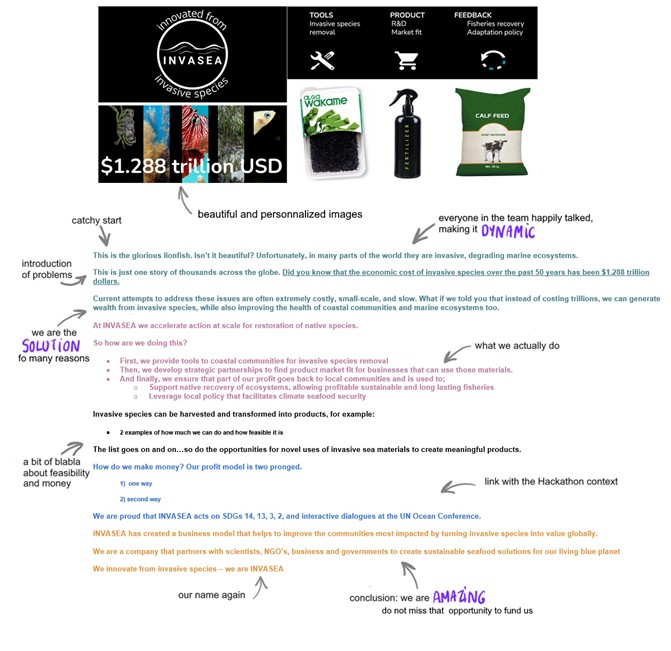
Figure of our pitch preparation - Two minutes to showcase why stakeholders need to fund our project: INVASEA.
We gave our pitch twice, I was freaking out twice, and then we won and I fell on the ground. So, we did ask ourselves whether we could go on with this project or another related one. We were selected to participate because we could already showcase our involvement and projects: we are already very busy and we split the grant amongst us. It raises questions on such events, bringing together incredible early career experts that also are the most bold, active and charismatic, and I cannot help but wonder where the others are and what we should do to encourage them to also join the discussion.
I do not have a business nor marketing mind. Although I wish not to, most of the time I see it as another world, far away from mine. Having to create a business model, learning about the mentors' work, and mostly discovering all the exciting projects the other participants created surely changed me. They were indeed creating their own business very often "for the oceans" and they dug into all the details we could even apprehend - and that is the hardest and the most amazing part.
Rebecca’s Hackathon journey as a mentor
I was very fortunate to be invited as a mentor to the Hack4Ocean II Youth Innovation Event in Brussels (23-24 November 2022), organized by the Directorate General for Maritime Affairs and Fisheries (DG Mare) of the European Commission. Young people, mainly undergraduate students, from all over Europe with an interest in anything related to marine sciences (oceanography, engineering, tourism, aquaculture, biotech, mining, energy, policy, education, social sciences, communication, finance, design, information technology, data science, innovation and entrepreneurship etc.) were invited to come together to brainstorm new ideas for some of the current ocean challenges. This sounded like a great event, so no wonder I said yes. This was my first hackathon ever! So, I was super excited, but also quite surprised by the invitation; why did they ask me of all people when they have so many amazing people available? But ignoring feelings of inferiority I opted to just jump at this great opportunity and was grateful that they asked me. After all, they wouldn’t have asked me if they thought I wouldn’t have anything to offer, right?
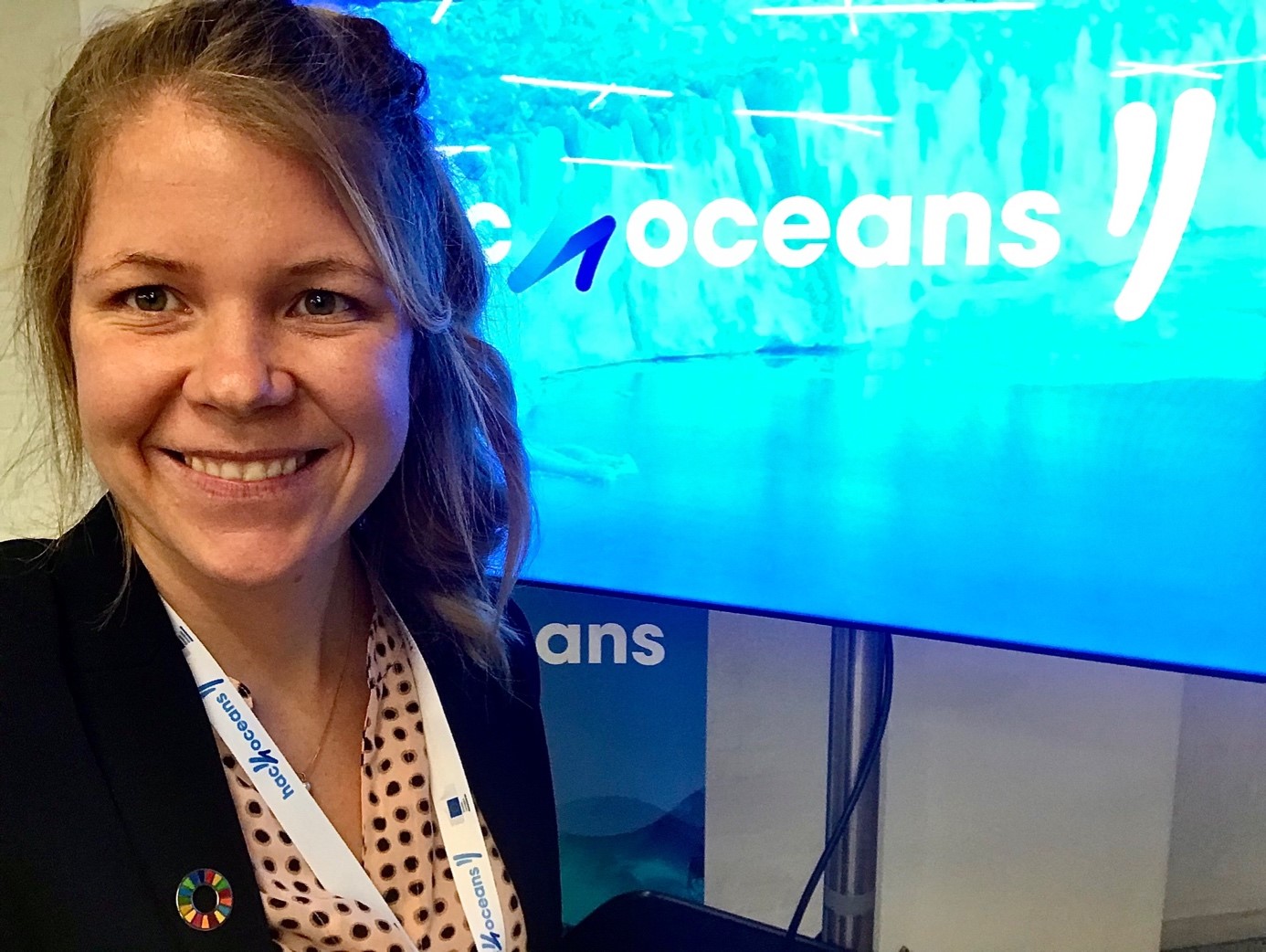
Picture of our Alumni-Ambassador Rebecca Zitoun at the Hack4Ocean II Youth Innovation Event in Brussels (23-24 November 2022).
The first challenge was to find a suitable mentor role for me. I had the choice between Business Expert, Pitch Coach, and Domain Expert. The organizers wanted participants to work on the topics of marine litter, ocean and climate change, coastal ecosystems, and new sustainable foods and resources. Each mentor was asked to take on two roles. While these aren't my areas of expertise, as a scientist I felt the most comfortable in the role of a Domain Expert, but I thought this was a great opportunity to get out of my comfort zone and engage in something different, so I signed up as a Business Expert and Pitch Coach. I thought that with my background in marine science, public outreach, ocean literacy, capacity development in under-resourced countries, and the interface between science and policy, I could be helpful to some of the groups and topics.
On the day of the event, we were informed that mentors were also welcome to participate in the “challenge insight sessions”, where participants would receive an introduction to the problems, they needed to find solutions to, and the “ideation session”. I gladly accepted this opportunity because I wanted to see how a group of up to six participants from different cultural and scientific backgrounds can work together in a short time (< 1 hour) to come up with a useful and innovative idea for a given problem. I attended two ideation sessions with two different groups, and it was very interesting to observe firsthand how group members interacted with each other. Working across disciplines with people from different backgrounds is something that this generation has really internalized. It was really great to see that everyone was very open to each other’s opinions and that other opinions and ideas were really respected and included in the thought process. That is something you don’t see very often in the professional world.
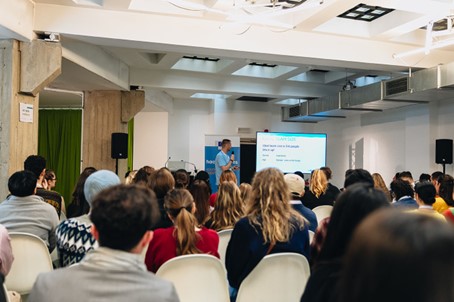
Picture of the Introduction Session (Creator: Oussama Dahra – Milestone; Copyright: OD-MP)
My task during the ideation session was to listen to the participants and point them in the right direction, not to let them get bogged down in details, and to make them understand that it is good to follow one’s instincts – after all, the best decisions are often made by trusting your instincts. My task was also to make them understand that an innovation doesn’t have to be something new, but can also be something already existing that can be used in a different context, region, or area.
It can often even be an advantage not to be an expert in a particular field, because as an outsider you have a completely different perspective. As an outsider you think differently, and that sometimes makes it easier to find new ways and thereby develop new and useful solutions and processes. Experts are usually so focused on their niche area that it is very difficult for them to think outside the box and try something new - creativity requires the courage to let go of certainties and this is something most scientists struggle with. That is also why the organizers urged participants to work on a challenge they are not familiar with, because that is where the creative mind in us starts to work, in a place we are not comfortable with. And it was quite obvious that participants who were unfamiliar with the topic had largely the best and most useful ideas. In these sessions, I loved seeing how the social scientists, engineers, and technicians were really thinking in terms of application and purpose, while most of the scientists were more concerned with the scientific relevance and correctness of the idea. And that’s exactly why events like this are great - we work outside of our comfort zones with people from different backgrounds and cultures that we have never worked with before, and so new ideas and ways of thinking emerge naturally if we can get past our egos and open ourselves up to these new ways of thinking. All in all, I was amazed at the things the two groups talked about and came up with in such a short time. And after hearing all the other ideas in the group presentation, I knew it would be difficult for the participants to form their final groups to work on the ideas that scored highest.
Then came the group formation, and the idea development and validation part for the groups. This meant that I was available to the groups as a Business Expert in the afternoon of the first day and in the morning of the second day to answer pressing questions about the usefulness, feasibility, and effectiveness of their idea. This was the session I was looking forward to the most, but looking at all the other experts, I was more than a little intimidated. The other experts were established and successful, mostly high-level business people, ranging from CEOs of their own technology companies, to founders of NGOs, to proper business consultants who worked for Google and Amazon. So, I was understandably a bit nervous when the first group arrived to consult with me – the groups were free to choose which expert to consult with, but there were only a limited number of spots available per experts, and of course the spots for the CEOs and founders were taken in no time. However, as I spoke to the six different groups who had booked a 30-min block with me, I realized pretty quickly that my scientific background in marine sciences, as well as my experiences in capacity development, ocean literacy, and policy were a blessing, which gave me some advantages over the other experts. While the other experts were able to help the participants in more detail regarding their business model, marketing strategies, and their more technical questions involving apps and other technologies, I was able to help them a bit more with the big picture and the validity of their solution because as a marine scientist, I have a good overview of the different marine solutions that are currently being worked on and therefore have a good idea of what is successful, what the problems are, and what needs and gaps generally exist. So, I really enjoyed talking to these groups and advising them on how to conceptualize their idea and guiding them through the process of mapping out their project. Questions that came up in the discussions (e.g., What is the goal of the project? What are the big unknowns? How can we address these unknowns? How is your idea different from existing solutions? Who are the stakeholders? What are the impacts of your project? What are the measures of success? How will you generate revenue and sustain the work?) were relatively new to most participants, but this led to very interesting discussions about viewpoints and long-term versus short-term thinking.
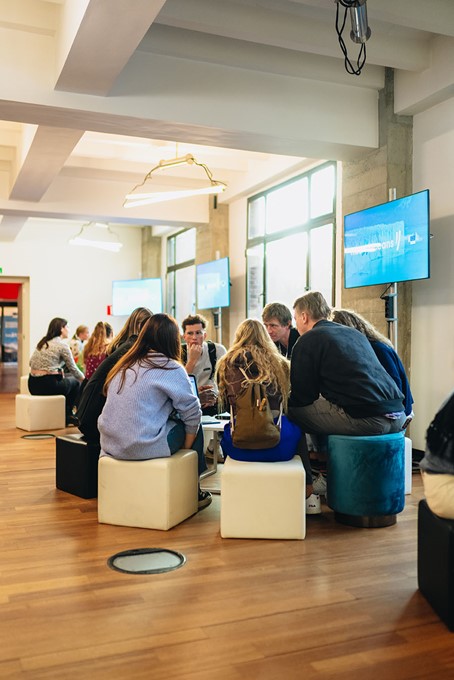
Picture of the Business Expert Session (Creator: Oussama Dahra – Milestone; Copyright: OD-MP)
On the second day, the idea validation session was followed by the development of a pitch. Each group had to pitch their idea at the end of the second day in 1 minute including slides in front of the other participants and the judges. Each group had 3 hours to prepare. And I think this is where the stress started for most participants, as most of them had never done anything like this before in their lives.
As a scientist, I am used to public speaking and giving presentations, and conveniently, I had just attended a communication and pitch training course to improve some of my own soft skills by learning all about the importance of storytelling in sciences. That's how I ended up signing up for the role of Pitch Coach. As I talked to the four groups who booked a session with me to help them with their pitch, I realized that this generation of Young Ocean Enthusiasts are masters at graphic design – their slides were mostly perfect – and additionally largely have the confidence to present themselves and their ideas. So, I hardly had to help them with that, and to be honest, I even learned a thing or two about how beautifully presentations can be done.
What most groups had to work on, though, was their actual pitch. One thing everyone should learn about when giving a presentation or a pitch is that one needs to tell a story. And the more compelling and intriguing the story, the better the pitch or presentation. Therefore, it is more important to talk about the WHY (WHY you are doing something) and not the WHAT you are doing, the WHAT automatically follows the WHY. Another important point to keep in mind is that pitches are better when they emotionally engage the audience, or in this case, the judges. This is why the WHY of a pitch is so important. Storytelling has always been the best way to get ideas out into the world - which is something we don’t learn in school and something that scientists unfortunately often forget in their presentations. It's that emotional connection, the little anecdotes you remember, and most importantly, the WHY that makes you win a hackathon. So, during my session with the groups I tried to teach them all about the importance of storytelling, i.e., I talked about the importance of the WHY, the ABT-framework (AND - BUT- THEREFORE; a very common science communication tool; Figure 2)), and the importance of addressing four questions; What (What is the goal for the group you are targeting)?, So What (Why should they care about supporting your cause)?, Now What (What do you want them to do)?, and Then What (What will be the next steps once successful)?.
That my guidance was successful was evident at the prize ceremony - the Hack4ocean event had four challenges with one winner per challenge and one overall winner - three of the six groups I coached as a Business Expert and three out of the four groups I helped as a Pitch Coach received a prize. Needless to say, I was very happy and proud to have been able to help these groups to the best of my ability.
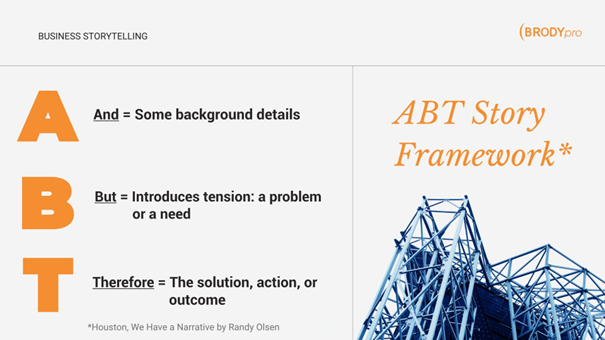
Schematic of the ABT-framework (Source: Brody.pro)
All in all, this event was an incredibly intense but amazing experience for me, both professionally and personally. I met amazing new people, had incredibly interesting conversations, and learned that my knowledge and skills are appropriate for a mentor. And with all the ocean challenges we currently face, it makes me happy to see that we have a whole generation of enthusiastic new thinkers ready to carry the torch after us to finally create the ocean we need and want.
Summary Guide:
Below you can find a little guide on how to successfully participate in hackathons, in which our ambassadors summarize their experiences.
Why is it important for ECOPs to take part in Hackathons?
As a participant in marine-related hackathons, ECOPs have the opportunity to work with talented peers and marine sector experts from across the world to develop innovative ideas that could become paths to an exciting career or a new venture in the marine sector.
As a participant you can expect a super intense experience packed with inspiration, insight and action. ECOPs will rapidly expand their professional network and together create new opportunities for a future career in the marine sector.
What should ECOPs keep in mind when they participate in a Hackathon?
Practice self-care: Rest well before the event and take some breaks during the challenge.
Engage: Talk to people, make new connections, and utilize them during the event for feedback or as group members.
Go out of your comfort zone (especially during the brainstorming phase): Challenge your thinking, try something new, go wild and suggest everything which comes to your mind.
Give yourself a chance: You might not be referred to as “experts” in this room but you probably are one in your field and know more about this topic than the other participants.
Be open and respectful: Listen to other opinions and attitudes without bias.
Reflect on your strength and weaknesses: Find your place in the group and work on the part of the project that you like the most or you have the most to offer in (e.g., graphical design, management, research, business model, communication)
Create a healthy and inclusive working environment: Make sure everyone in the team feels comfortable and has space to express themselves. You can suggest to your team to organize how you work (e.g., raising hands, shaking your haeds if you agree, someone moderating or taking notes on a shared document).
Ask for help: Make use of the experts/mentors at any time -not only when you are stuck. They are there for a reason.
Use existing tools: Use well-known science communication tools or your pitch (i.e., ABT-framework) and guiding questions for your business model plan (i.e., What is the goal of the project? What are the big unknowns? How can we address these unknowns? How is your idea different from existing solutions? Who are the stakeholders? What are the impacts of your project? What are the measures of success? How will you generate revenue and sustain the work?).
Promote yourself: This is a space for you, not only for the Hackathon, so use it to highlight your other work, and reach out to people that could help you for other projects.
Provide feedback: share what you liked, how they can improve their event (starting by providing the opportunity to feedback), their consideration of ECOPs in next events.
Choose how to engage: there will be sponsors, esteemed guests, and jury members. You can also reach out to them or use this space for your group. Youth is often tokenized: you can choose how to engage with this (e.g., not to be in pictures with people or companies you do not agree with).
Hackathons in the marine related sector that ECOPs can participate in: